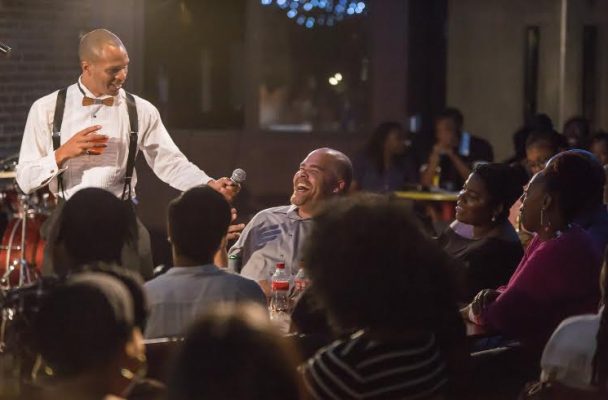Josephus Thompson and The Poetry Café bring slam poetry to HPU

Josephus Thompson III hosts The Poetry Café at the Triad Stage in downtown Greensboro. Photo by amazon.com
By Delaney Geraghty
Staff Writer
Love. Trauma. Racism. Toxicity. Power. Colonialism. Dependency. Assault. Happiness.
These topics were a few of many emotional projections at The Poetry Café, an interactive open mic experience that came to High Point University on February 11th.
The event was part of HPU’s Multicultural Affairs’ Africana Heritage Week, as well as Black Cultural Awareness and Black Student Union’s celebrations of Black History Month. Complete with live, genre spanning music, compelling poems and charismatic, engaging hosts and performers.
The Poetry Café offered unity and catharsis for students and community members. The atmosphere reflected the goal of The Poetry Project, the larger community effort that en- compasses The Poetry Café.
Founded in 2009 by Josephus Thompson III, The Poetry Cafe began as a free series of events in downtown Greensboro that aimed to make poetry more accessible for everyone. It was initially financed by a grant received from the Arts Council of Greensboro.
Now, The Poetry Café is located at the Upstage Cabaret in the Triad Stage build- ing. Performances are held every other Saturday at 9 p.m. for $15 per ticket. In recent years, the show began touring colleges. It also airs as a radio broadcast on 90.1 FM, and recorded performances are available to stream on Amazon Prime.
“The Poetry Café is about creating com- munity,”Thompson said.
He explained that even if audience members may not know each other, they can all sing along to a song together. This way, the music fosters a sense of solidarity among its listeners.
Throughout the evening, Thompson and his co-host, a soulful songstress, encouraged the audience to not only sing along but to also shout affirmations and snap or clap to show support. They established a genial back-and-forth rapport with some vocal attendees.
“That is what the café is built upon: using music and our voices to connect to one another,”Thompson said.
Douglas McCollum, an HPU senior, was paramount in bringing this event to campus because the university lacks diversity. According to the College Board, 78% of students who attend HPU are white.
McCollum, a High Point city native, met Thompson when he was a highschool freshman, around the time he discovered spoken word poetry. Thompson taught a poetry workshop at the school, and during McCollum’s sophomore year, they began working together.
Over time, Thompson has served as McCollum’s teacher, coach and mentor. Now, Thompson is McCollum’s boss, and they work together to expand The Poetry Café’s reach. Hosting the recent open mic event at HPU was part of that effort.
“In the grand scheme of things, [poetry] allows people the opportunity to share things that they would not normally do on a regular basis, which is why the open mic on campus is so important to me,” McCollum said.
Similar to Thompson’s passions, spoken word poetry constitutes a driving force in McCollum’s life. He wrote his first slam poem when he was a high school freshman and has expanded upon that love ever since.
“I kind of knew that I liked stages,” McCollum said. “I knew that I took a lot from the Dr. Kings and the Malcolm X’s of the world and wanted to be an orator or performer of sorts.”
McCollum has also played a role in introducing poetry to different communities. He, along with two co-presenters, hosts College Night Open Mic, another slam poetry event held at the Triad Stage in downtown Greensboro. This event takes place every other Thursday from 7 to 9 p.m., and tickets can be purchased online for $5 or at the door for $8.
McCollum also works at the Community Writing Center in High Point, and the Poetry Project holds poetry workshops for the students there.
“I think there is a lot of voice and enfranchisement that goes along with it,” said McCollum, about the poetry outreach efforts.
He added that young people can sometimes feel voiceless, especially if they live in disadvantaged communities.
“To learn that what they say means something is important,” said McCollum.
For McCollum, slam poetry serves as an indispensable outlet for artistic expression and emotional healing.